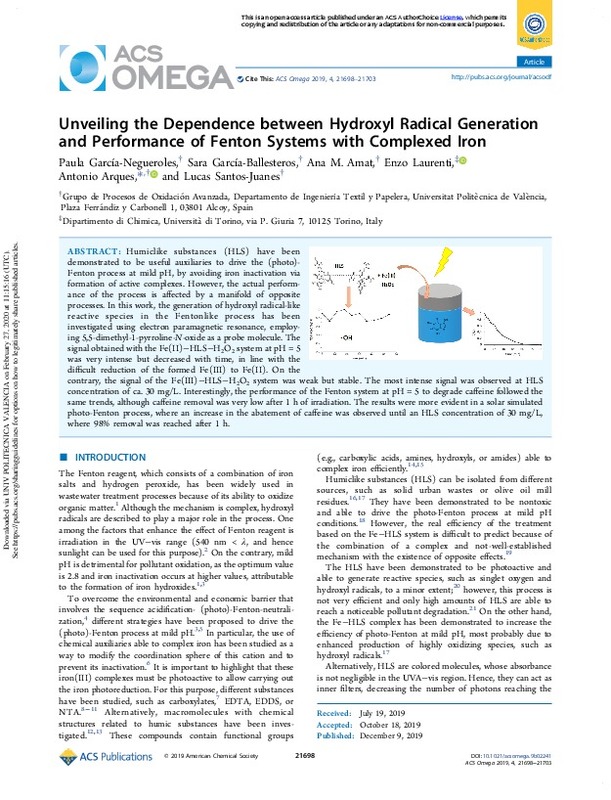JavaScript is disabled for your browser. Some features of this site may not work without it.
Buscar en RiuNet
Listar
Mi cuenta
Estadísticas
Ayuda RiuNet
Admin. UPV
Unveiling the Dependence between Hydroxyl Radical Generation and Performance of Fenton Systems with Complexed Iron
Mostrar el registro sencillo del ítem
Ficheros en el ítem
| dc.contributor.author | García-Negueroles, Paula
|
es_ES |
| dc.contributor.author | García-Ballesteros, Sara
|
es_ES |
| dc.contributor.author | Amat Payá, Ana María
|
es_ES |
| dc.contributor.author | Laurenti, E.
|
es_ES |
| dc.contributor.author | Arqués Sanz, Antonio
|
es_ES |
| dc.contributor.author | Santos-Juanes Jordá, Lucas
|
es_ES |
| dc.date.accessioned | 2020-09-24T12:28:40Z | |
| dc.date.available | 2020-09-24T12:28:40Z | |
| dc.date.issued | 2019-12-24 | es_ES |
| dc.identifier.uri | http://hdl.handle.net/10251/150629 | |
| dc.description.abstract | [EN] Humiclike substances (HLS) have been demonstrated to be useful auxiliaries to drive the (photo)-Fenton process at mild pH, by avoiding iron inactivation via formation of active complexes. However, the actual performance of the process is affected by a manifold of opposite processes. In this work, the generation of hydroxyl radical-like reactive species in the Fentonlike process has been investigated using electron paramagnetic resonance, employing 5,5-dimethyl-1-pyrroline-N-oxide as a probe molecule. The signal obtained with the Fe(II)-HLS-H2O2 system at pH = was very intense but decreased with time, in line with the difficult reduction of the formed Fe(III) to Fe(II). On the contrary, the signal of the Fe(III)-HLS-H2O2 system was weak but stable. The most intense signal was observed at HLS concentration of ca. 30 mg/L. Interestingly, the performance of the Fenton system at pH = 5 to degrade caffeine followed the same trends, although caffeine removal was very low after 1 h of irradiation. The results were more evident in a solar simulated photo-Fenton process, where an increase in the abatement of caffeine was observed until an HLS concentration of 30 mg/L, where 98% removal was reached after 1 h. | es_ES |
| dc.description.sponsorship | The authors want to acknowledge the financial support from Ministerio de Ciencia, Innovacion y Universidades (RTI2018-097997-B-C31) and European Union (645551-RISE-2014, MAT4TREAT). P.G.-N. would like to thank Spanish Ministerio de Economia y Competitividad for her fellowship (BES-2016-077962). | es_ES |
| dc.language | Inglés | es_ES |
| dc.publisher | American Chemical Society | es_ES |
| dc.relation.ispartof | ACS Omega | es_ES |
| dc.rights | Reconocimiento - No comercial (by-nc) | es_ES |
| dc.subject | Humic-Like substances | es_ES |
| dc.subject | Bio-Based substances | es_ES |
| dc.subject | Photo-Fenton | es_ES |
| dc.subject | Mild conditions | es_ES |
| dc.subject | Urban waste | es_ES |
| dc.subject | Neutral Ph | es_ES |
| dc.subject | Oxidation | es_ES |
| dc.subject | Degradation | es_ES |
| dc.subject | Pollutants | es_ES |
| dc.subject | Water | es_ES |
| dc.subject.classification | QUIMICA FISICA | es_ES |
| dc.title | Unveiling the Dependence between Hydroxyl Radical Generation and Performance of Fenton Systems with Complexed Iron | es_ES |
| dc.type | Artículo | es_ES |
| dc.identifier.doi | 10.1021/acsomega.9b02241 | es_ES |
| dc.relation.projectID | info:eu-repo/grantAgreement/EC/H2020/645551/EU/Enhancing water quality by developing novel materials for organic pollutant removal in tertiary water treatments/ | es_ES |
| dc.relation.projectID | info:eu-repo/grantAgreement/AEI//BES-2016-077962/ | es_ES |
| dc.relation.projectID | info:eu-repo/grantAgreement/AEI/Plan Estatal de Investigación Científica y Técnica y de Innovación 2017-2020/RTI2018-097997-B-C31/ES/TECNOLOGIAS AVANZADAS E HIBRIDAS PARA ELIMINACION DE CONTAMINANTES, MICROCONTAMINANTES, REUSO Y REVALORIZ. EN DIFERENTES AGUAS RESIDUALES, INCLUYENDO ENFOQUES TECNO-ECONOMIC/ | es_ES |
| dc.rights.accessRights | Abierto | es_ES |
| dc.contributor.affiliation | Universitat Politècnica de València. Departamento de Ingeniería Textil y Papelera - Departament d'Enginyeria Tèxtil i Paperera | es_ES |
| dc.description.bibliographicCitation | García-Negueroles, P.; García-Ballesteros, S.; Amat Payá, AM.; Laurenti, E.; Arqués Sanz, A.; Santos-Juanes Jordá, L. (2019). Unveiling the Dependence between Hydroxyl Radical Generation and Performance of Fenton Systems with Complexed Iron. ACS Omega. 4(26):21698-21703. https://doi.org/10.1021/acsomega.9b02241 | es_ES |
| dc.description.accrualMethod | S | es_ES |
| dc.relation.publisherversion | https://doi.org/10.1021/acsomega.9b02241 | es_ES |
| dc.description.upvformatpinicio | 21698 | es_ES |
| dc.description.upvformatpfin | 21703 | es_ES |
| dc.type.version | info:eu-repo/semantics/publishedVersion | es_ES |
| dc.description.volume | 4 | es_ES |
| dc.description.issue | 26 | es_ES |
| dc.identifier.eissn | 2470-1343 | es_ES |
| dc.identifier.pmid | 31891048 | es_ES |
| dc.identifier.pmcid | PMC6933578 | es_ES |
| dc.relation.pasarela | S\403668 | es_ES |
| dc.contributor.funder | European Commission | es_ES |
| dc.contributor.funder | Agencia Estatal de Investigación | es_ES |








